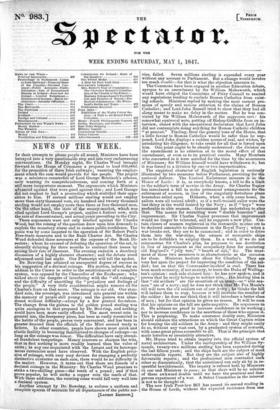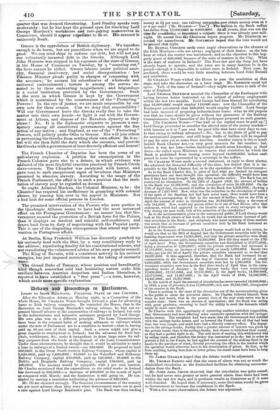NEWS OF THE WEEK.
IN their attempts to please people all round, Ministers have been betrayed into a very questionable step and into very embarrassing conversations. On Monday night, Sir Charles Wood brought forward in the House of Commons a proposal to lend 020,0001.•for the promotion of three Irish railways ; vaunting the employ- ment which the sum would provide for the people. The project was a miniature counterfeit of Lord George Bentinck's scheme, -only wanting its comprehensiveness, and coming forth at a still more inopportune moment. The arguments which Ministers advanced against that were good against this' and Lord George did not neglect to hail a proceeding which stultified their oppo- sition to him. If sixteen millions sterling would not employ more than sixty thousand men, six hundred and twenty thousand sterling would not employ more than three or four thousand men. On the other hand, the state of the money-market, which was cited against Lord George's project, applies it fortiori now, with the rate of discount raised, and actual panic prevailing in the City.
These arguments were not only levelled against Sir Charles Wood, but the raising of the question drew upon him demands to explain the monetary alarm and to restore public confidence. The panic was by some Imputed to the operation of Sir Robert Peel's Free-trade measures and to the Bank Charter Act. Sir Charles Wood defended those measures at the expense of the Bank Di- rectors ; whom he accused of defeating the operation of the act, in absurdly delaying for three months to contract their issues by raising their rate of discount. The evening endedin a desultory discussion of a highly alarmist character; and the debate stood adjourned until last night. Our Postscript will tell the upshot.
Dr. Bowring has attained an unexpected degree of success in his suggestion of a decimal coinage. His motion, indeed, for an address to the Crown in order to the establishment of a complete system, was opposed by the Chancellor of the Exchequer ; who talked about the dangers of interfering with the "old coinage," and the difficulty of unsettling the "prejudices and feelings of 'the people." A very little consideration might remove all Sir Charles's fears on that score. The coinage is not old. Our stan- dard coin, the sovereign, was introduced into general use within the memory of people still young; and the guinea was aban- doned without difficulty—except by a few genteel fee-takers. The change from the guinea to the golden pound sterling was quite analogous to that proposed by Dr. Bowring, and nothing could have been more easily effected. The most recent coin in general use, the fourpenny piece, has been as easily reconciled to the habits of the people, proves very convenient, and has been in greater demand than the officials of the Mint seemed ready to believe. In other countries people have shown most quick and elastic facility in becoming familiarized to changes of coinage—so long as the coinage was honest. The difficulties have only attend- ed fraudulent tampering& Money interests so sharpen the wits, that in fact nothing is more readily learned than the value of coins ; as any one acquainted with the Levant and its heteroge- neous currencies must have observed. With the English preci- sion of coinage, with very easy devices for stamping a perfectly distinctive character on each coin, there would be no difficulty in the matter. However, it turns out that there are friends of a decimal coinage in the Ministry: Sir Charles Wood promises to strike a two-shilling piece—the tenth of a pound ; and if that prove popular, he will strike a copper coin the tenth of that. Ye ith these additions, the existing coins would fall very well into a decimal system.
Another attempt by Dr. Bowring, to enforce a uniform and complete system of accounts for all departments of the public ser- [LATEST EDITION.]
vice, failed. Seven millions sterling is expended every year without any account to Parliament. But a change would involve too much trouble—for that is what the objection amounts to. The Commons have been engaged in another Education debate, apropos to an amendment by Sir William Molesworth, which would have obliged the Committee of Privy Council to rescind. any regulations tending to exclude Roman Catholics from exist- ing schools. Ministers replied by making the most earnest pro- mises of speedy and serious attention to the claims of Roman Catholics; and Lord John Russell tried to show that they had all along meant to make no delay in the matter. But he was con- victed by Sir William Molesworth of the supyressio yen: his somewhat equivocal note, putting off Bishop Griffiths from an in- terview, closed with the unequivocal declaration that Lord John did not contemplate doing anything for Roman Catholic children "at present." Finding, from the general tone of the House, that a little favour to Roman Catholics would be safer than he sup- posed, Lord John displays a sudden access of zeal, and wishes, by antedating his diligence, to take credit for all that is forced upon him. One point ought to be clearly understood: the division on the amendment is no criterion as to the moral effect of that amendment, or even as to its practical results. Many Members who concurred in it were satisfied for the time by the assurances of Ministers; Sir William himself would have withdrawn it; but it was forced to a division by one or two impracticables. The empirical character of English legislation is curiously illustrated by two measures before Parliament, providing for the national defence. The Limited Enlistment measure is in the House of Lords : it is, as everybody knows, a bill to fix a limit to the soldier's term of service in the Army. Sir Charles Napier has introduced a bill to make permanent arrangements for the enlistment of seamen, in lien of the singularly fortuitous plans heretofore relied upon. Hitherto, when a ship came home, its sailors were all turned adrift ; as if a well-trained sailor were the last thing in the world desired by the Navy ; as if " boys " were preferable to able seamen.. Government has undertaken to alter that. The means for recruiting were "double bounties" and. impressment. Sir Charles Napier presumes that impressment would no longer be tolerated, and he suggests a new plan. Cer- tain classes of seamen registered in the mercantile marine are to be declared amenable to enlistment in the Royal Navy ; when a war breaks out, they are to be summoned ; and in order to drive them into the war-ships, the owners of mercantile ships are to be forbidden to employ them. - In a word, if we do not misconstrue Sir Charles's plan, he proposes to use destitution in lieu of impressment as the compulsory force for mustering old England's "jolly tars," "hearts of oak," Scc. The treat- ment of these two measures is as pharacteristic as the occasion for them. Ministers hesitate about Sir Charles's. They are very hot upon the project for improving the condition of the sol- dier ; but on that the Commander-in-chief is cool. There has been much curiosity, if not anxiety, to learn the Duke of Welling- ton's opinion : each side claimed him : he has now spoken, and it proves that he really belongs to neither side. His leading idea is that "old soldiers" are the essentials of an army—as able sea- men" are of a navy ; and he does not think that Mr. Fox Maulei's bill will turn the old soldiers out of our Army ; he thinks the bill will induce them to stay, because it will increase the comfort of the soldier : he does not think that it will introduce a better class of men ; but for that opinion he gives no reason. It will be seen that his opinions on the bill are quite negative. He acquiesces in it. He adduces no proof to increase confidence in its working; nor to increase confidence in the assertions of those who oppose it. This is perplexing. To make assurance doubly sure, Ministers should enhance the attractions on which the Great Captain relies for keeping the old soldiers in the Army : and they might easily do so, without any vast cost, by a graduated system of rewardas, with some great prizes accessible to all. That is the principle that made lotteries so irresistibly attractive. Mr. Hume tried to obtain inquiry into the official system of naval architecture. Under the surveyorship of Sir William Sy- monds, twenty-two millions sterling has been expended during the last fifteen years-' and the ships built are the subject of most unfavourable reports. But they are the subject also of highly favourable reports ; and the professional men contradict each other so diametrically, that the uninitiated can only sit by in re- spectful bewilderment. The inquiry is refused both by Ministers in esse and Ministers in posse; so that there will be no solution of these awkward doubts until we have the practical and dan- gerous experiment of a war. A Select Committee in the interval
is not to be thought of. •
The new Irish Poor-law Bill has passed its second reading in the House of Lords, without the expected resistance from one quarter that was deemed threatening. Lord Stanley speaks very moderately : but he has kept the ground open for renewing Lord George Bentmck's workhouse and rate-paying manceuvres in Committee, should it appear expedient to de so. His manner is ominously frank.



























